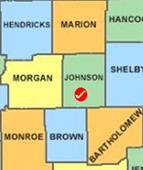Author Archive
52 Stories #15—Places I Have Lived
 Like many Americans, I have moved around a bit:
Like many Americans, I have moved around a bit:
- I was born in Laramie, Wyoming. My parents and I lived at a place on Rainbow Street—a house? an apartment? Of course, I do not recall. We stayed there only a month or two after I arrived so that my dad could complete his college degree at the University of Wyoming.
- After his graduation, my dad remained in Wyoming for some job training while my mom and I went to live for the summer with my grandparents in Rapid City, South Dakota. I was baptized at the Lutheran Church there. I do remember my grandparents’ address, 232 St. Andrew, because I used to write letters to my grandmother at that address as I grew older.
- When my father completed the training phase of his career as a petroleum landman, he took an assignment in Bismarck, North Dakota. There we moved into an upstairs apartment owned by the Fossum family. We did not stay long, but it was an ideal location for our young family. Without a car of our own, my parents could walk anywhere they needed to go. The Red Owl grocery store was across the street in one direction, my dad’s office was kitty-corner, and the Lutheran Church was across the street the other direction.
- My brother arrived 20 months after me, and by then we needed to move to a larger place. My folks located a rental house on 16th street in Bismarck. We occupied the ground floor, and another family lived in the basement apartment.
- In another year or so, we moved up in the world again. We rented the house at 1300 N. Fourth St. in Bismarck, right across the street from the North Dakota Capitol Building. A place all to ourselves! My mom put in a garden, bought a house full of Ethan Allen furniture, and joined a bridge club. We got our first television set and another baby brother arrived. I started school.
-
When I was in the middle of the first grade, my dad was transferred to Sidney, Nebraska. We rented the ranch-style house at 1332 23rd Avenue. It was bigger than our previous home, and I had my own bedroom. Of all the places we lived, I think this house was my mom’s favorite. But my dad did not like Sidney, and he kept his eye out for another position within his company.
His chance came 15 months later when management consolidated the field offices into the Casper, Wyoming office.
- In Casper, my parents could not locate a suitable place to rent. They finally decided to buy their first house at 1544 So. Beverly (now Fairdale St.). Several of my dad’s co-workers purchased homes in the same neighborhood, so we had a ready-made community of familiar faces. Again, I had my own room. I passed it along to my baby sister a couple of years after she was born. My dad built a new room for me in the basement. The elementary school was around the corner, and my parents never dreamed we would still be in Casper when it came time for us to attend junior high. To their surprise, all of us graduated from high school in Casper.
- From there, I followed in my parents’ footsteps and attended the University of Wyoming. For a couple of years, I lived in the Women’s dorm, White Hall. My high school chum Karen was my roommate. Then I married, and my husband/tech advisor and I moved into married student housing.
- After graduation, he took employment in Austin, Texas. Over the Christmas holidays, we moved into the Pepperwood Apartments at 6710 Burnet Lane. He commuted to work on a motorcycle while I drove our only car to work at a Lutheran Pre-school and Day Care.
- After a year, we wanted a dog, so we moved on to the Dawnridge complex of townhouses in Austin. Our closest neighbors were cockroaches. Robbers found us.
- We hoped that buying our first house would offer us more security and perhaps some freedom from nasty bugs. A new subdivision of starter homes called Lamplight Village was going up north of Austin. We purchased the property at 13003 Powderhorn and watched as the house was built. When it was completed, we settled in, and our first son was born.
- Within a couple of years, however, we had had enough of the sweltering Texas weather. We decided to return to Wyoming for its cool summer nights and proximity to our families. We bought a bi-level house at 118 Jonquil in Casper and began improving it. Another son was born, and we planned to stay put.
- Life had other plans, and I was transferred to Colorado with my oil company job. We bought a two-story house on a large lot at 5526 E. Hinsdale Circle in Centennial. Our boys grew up there, and we stayed 26 years. By then, Centennial had really grown. Noisy traffic streamed past our house. The city allowed a 40′ cell phone tower to be installed close to our bedroom window. We decided the time had come to move on.
- Now we live in an adult community surrounded by green belts and open space. We have friendly neighbors. This neighborhood is ideal for us, and we hope to stay here a long time.
A New Insight For a Brick Wall Ancestor
 My third great-grandfather, Daniel Sherman, seemingly dropped out of the sky into Kentucky in the 1820’s. I know nothing about his life before then. His place and date of birth, family members, and reason for settling in Kentucky all elude me.
My third great-grandfather, Daniel Sherman, seemingly dropped out of the sky into Kentucky in the 1820’s. I know nothing about his life before then. His place and date of birth, family members, and reason for settling in Kentucky all elude me.
He showed up in Morgan County, KY in the mid-1820’s. There he married Rebecca Howe Day on 4 September 1826. After that, his name appears regularly in the Kentucky records until 1863. That April, he and Rebecca sold a small plot of land, and Daniel disappeared from the record as mysteriously as he entered it.
U. S. census records for 1850 and 1860 tell me that Daniel was a blacksmith born around 1800 in either New York or Vermont. Why a guy from that region would relocate to Kentucky always puzzled me. Migration from the far north to the south does not match the usual migration patterns I have seen.
The other day, I mentioned this question to a fellow genealogist who has New York ancestors herself. She came up with a possible explanation. She reminded me that Kentucky is horse racing country, and that industry needs blacksmiths. Could that be why Daniel Sherman went to Kentucky?
My friend got quite interested in this line of inquiry and followed up by contacting the historical society in the last county where my ancestor lived—Madison County, KY. The President of the Society, Tom Black, replied with the following information:
All of Kentucky had lots of horses through the 19th century. Locally, most of them were work horses which also needed a blacksmith’s attention so he could have potentially been servicing them. We had no race horses of note that I am aware of and no local farms that had more than a handful. However, show horses have been a Madison County staple for a long time, and we have seen a great number that were competitive and a few that became champions. All that said, he would have been a busy man if working locally.
Perhaps Daniel followed an opportunity when he headed south. If he became a busy man working as a Kentucky blacksmith, he was fortunate to have four sons. They all learned the blacksmith trade and became working blacksmiths themselves. Some of Daniel’s grandsons followed that profession, too, until it faded away after World War I. Horse country provided them all with a means to make a living.
52 Stories #14—My Home Town
 Most people have a home town. Usually we think of it as the place where we grew up. We went to school and church there, we knew the neighbors, and we often had family members who lived nearby. Memories of a home town bring us a sense of familiarity and belonging.
Most people have a home town. Usually we think of it as the place where we grew up. We went to school and church there, we knew the neighbors, and we often had family members who lived nearby. Memories of a home town bring us a sense of familiarity and belonging.
So where was my home town? I think I know. Although I was born in one place, and I lived in three other localities before I went off to college, my family stayed only a short time in a couple of those places.
If I must choose a home town, I would have to say that I spent most of my formative years in Casper, Wyoming. We moved there right after I had completed the second grade. I lived there until I was graduated from high school ten years later.
Casper was an oil town in those days, and my dad worked in the oil business. Many of the neighbors did, too, so I had that in common with the other kids at school. After I had grown up and completed my education, I returned to Casper to work in the oil patch myself.
My husband/tech advisor (also from Casper) and I resided in Casper for about four years when our children were small. We enjoyed those days where we were surrounded by familiar places and people. We continued the outdoorsy activities we had known growing up—camping, hunting, fishing. We thought we would always stay there.
Yet life had other plans. The oil business in Casper dried up, and we moved on to Colorado. After many years away from Wyoming, our kids would call our new state “home” although we would not. To us, Wyoming, especially Casper, is our home town. We return there as often as we can to visit our siblings.
When there, we try to visit the old, familiar places. We attend the church where I was confirmed and my picture is on the wall. We go snowshoeing on Casper Mountain. We camp in the Big Horn Mountains and in the Snowy Range. We go swimming at the Thermopolis Hot Springs. We hike along the North Platte River and visit historic sites like Independence Rock and the Oregon Trail ruts. We love Wyoming with its stark beauty and sparse population.
No matter how long we live somewhere else, Casper will always feel like home to us. Even after so many years living elsewhere, we still know our way around Casper. Family members who have gone before us are buried in the local cemeteries. We attend our high school reunions there and re-connect with old friends. Whenever we visit, we feel at home.
We will always be Wyoming Cowboys. The Wyoming state song sums it up for us:
Wyoming
In the far and mighty West,
Where the crimson sun seeks rest,
There’s a growing splendid state that lies above,
On the breast of this great land;
Where the massive Rockies stand,
There’s Wyoming young and strong, the State I love!
Chorus
Wyoming, Wyoming! Land of the sunlight clear!
Wyoming, Wyoming! Land that we hold so dear!
Wyoming, Wyoming! Precious art thou and thine!
Wyoming, Wyoming! Beloved state of mine
Taking the Plunge On A DNA Test
 The genealogical proof standard has always obliged us to do an exhaustive search for every ancestor. In the past decade, DNA testing has become widely available as a research tool to use in addition to older research methods. Today an exhaustive search means using DNA testing as part of a proof, and many genealogists have tested their DNA.
The genealogical proof standard has always obliged us to do an exhaustive search for every ancestor. In the past decade, DNA testing has become widely available as a research tool to use in addition to older research methods. Today an exhaustive search means using DNA testing as part of a proof, and many genealogists have tested their DNA.
Although I know this, I still have not completed a DNA test myself. For privacy reasons, I have been reluctant to do so. I have worried about putting my results out there somewhere and about who might have access to this information. Would I open myself to discrimination if my test fell into the wrong hands? Could someone subpoena my results and use them against me in court?
After attending several seminars on DNA testing, it has now become clear to me that I would risk very little if I took a DNA test for genealogical purposes. In fact, I might learn a little more about my family.
I do have some puzzles in my heritage that a DNA test might help me solve:
- I have an unknown great-grandfather, a man who contributed 1/8 of my DNA. Having autosomal results on file with a DNA testing company could help me locate his family and identify him.
- The same goes for my mysterious German great-great grandmother, who contributed an additional 1/16 of my DNA.
- I am curious about my maternal line, reportedly from Finland but whose members resided awfully close to Russia. Is my maternal line truly Finnish, or do we have some Russian? A mitochondrial test could help me find relatives whose ancestors stayed behind when my Finnish great-grandmother Ada Alina Lampinen immigrated to America in 1905.
I have spent years trying to locate information on my unidentified ancestors with no success. DNA testing may be my only hope of ever discovering who they might be. Consequently, my desire to resolve these questions has finally overcome my inhibitions and convinced me to take a DNA test.
This week, FamilyTreeDNA has a sale on test kits. For a $70 savings, I just ordered an autosomal test and a mitochondrial test. Will I find answers to any of my questions after I submit my test results?
Travel Goes Awry
 This week we have seen much press and social media coverage of an incident aboard a United Airlines plane in Chicago. Like so many others around the world, I have watched in horrified fascination as the story unfolded—viewing the video, listening to news reports, and following the Twitter commentary. Late-night talk show hosts roasted the airline. We have many witty Americans who suggested numerous new slogans for United Airlines (see #UnitedAirlinesNewMottos).
This week we have seen much press and social media coverage of an incident aboard a United Airlines plane in Chicago. Like so many others around the world, I have watched in horrified fascination as the story unfolded—viewing the video, listening to news reports, and following the Twitter commentary. Late-night talk show hosts roasted the airline. We have many witty Americans who suggested numerous new slogans for United Airlines (see #UnitedAirlinesNewMottos).
Apparently, the man on the plane committed the sin of quietly boarding the plane with his valid ticket and then taking his assigned seat. Suddenly, the airline decided they wanted that spot for a non-revenue flyer, leaving no room for the man who thought he was on his way home. The crew ordered him off. When he refused to comply because he needed to get home, they brought in law enforcement to compel the unarmed, elderly man to leave. These reinforcements quickly bloodied the man, knocked out his teeth, and rendered him unconscious. Then the thugs security officers proceeded to drag him down the aisle and out of the plane. He ended up in the hospital for three days. The airline called this incident a re-accommodation, saying they had asked nicely for so-called volunteers first.
As the week progressed, I was surprised to learn that many airlines follow the same procedure of boarding ticket holders only to turn around and force them off the plane before departure. Numerous people have come forward in recent days to tell stories of how they, too, have been checked in, security screened, and settled in their seats only to be randomly selected to leave the plane. One man said he had been threatened with handcuffs. I saw videos of other passengers crying and pleading to stay on the aircraft so they could get to weddings, funerals, graduations, etc. on time. Airline staff always turned a deaf ear. It reminds me of the Shirley Jackson short story, The Lottery, where townspeople stone to death a randomly-selected neighbor.
A couple of questions have come to my mind after the United incident:
- Why did United think this type of extreme action was necessary in this case? The plane was meant to fly to Louisville, a 4-hour drive from Chicago. When United could not lure anyone to give up a seat on the flight, why not secure other means of travel for the crew instead of inconveniencing their paying passengers? Several options occurred to me, including a flight on another airline, a limousine or rental car, or a private plane. After the delays on the flight in question, the crew would have arrived in Louisville at about the same time.
- Why is airport security getting involved in situations where the airlines have intentionally provoked passengers entrusted to their care? These are not situations where an individual has come aboard and then become violent or posed a threat to anyone. Perhaps the airlines would find a better way to meet their own needs if they had to hire their own bouncers for disagreements they instigate.
And a final question: What does all this have to do with genealogy?
Well, genealogists must travel sometimes for research purposes or to attend conferences. Now, in addition to worrying about TSA intrusions on the ground, flight delays for weather or mechanical reasons, and normal fear of flying, we must sit apprehensively in our assigned seats while dreading what the crew might do to us before the plane actually takes off. We must wonder, will I be the one told either to leave or to risk getting beaten up and sent to jail? Will I have to watch it happen to someone else?
Because air travel was already so unpleasant, I have not flown in three years. This year, however, I decided to make a trip to Germany to see some family villages and to go on tour with my choir. The timing of the United incident, just weeks before my own trip, has really raised my stress level over my travel plans. I can only hope that flying overseas on a customer-friendly foreign carrier will help me avoid an abusive situation. I am not frightened enough to cancel my trip, but I know it will take a great incentive for me to ever schedule another one, especially on a domestic flight. I would rather drive or take the train.
#ShameOnUnited
52 Stories #13—Childhood Homes
 Back in the 50’s and 60’s, when your dad worked in the oil business you moved around a lot. The petroleum companies liked to give people some experience in their various field offices, so they transferred people every couple of years. My dad, a petroleum landman, needed to acquire knowledge of the various oil fields operated by his company. Our family packed up and moved several times to accomplish that.
Back in the 50’s and 60’s, when your dad worked in the oil business you moved around a lot. The petroleum companies liked to give people some experience in their various field offices, so they transferred people every couple of years. My dad, a petroleum landman, needed to acquire knowledge of the various oil fields operated by his company. Our family packed up and moved several times to accomplish that.
Dad took a job with The Ohio Oil Company in 1954, right after he graduated with a degree in business from the University of Wyoming. They sent him to Casper, Wyoming for training, and my mom and I moved in with my maternal grandparents in Rapid City, South Dakota for the summer. I was still an infant.
That fall, my dad began his first assignment in Bismarck, North Dakota. Our little family took up residence in an upstairs apartment across the street from his office. I have a couple of vague recollections of living there, but we did not stay long.
Soon my brother was on the way. We moved to larger accommodations, the ground floor of a small house. Another family lived in the basement. Again, I sort of recall the place, and again, we did not stay long.
When I was 2 ½, we began renting a house all to ourselves. Constructed a few years earlier for a raffle, this house was known locally as “The Dream House”. It sat across the street from the North Dakota capitol building and had two bedrooms, a living room, a small kitchen, and a basement. My brother and I shared one of the bedrooms and slept in bunk beds. The house had a nice, fenced yard where we spent many hours playing with the neighbor kids. Another brother arrived while I was in kindergarten.
All too soon, the time came for my dad to move on to another assignment. We relocated to Sidney, Nebraska while I was in the first grade. This time we rented a 3-bedroom house. I had my own room, and my brothers shared a room. We quickly made friends with the kids at school, but my dad did not like Nebraska. He requested a transfer almost as soon as we arrived.
We moved again, to Casper, Wyoming, when I finished the second grade. My parents looked for another house to rent. Nothing seemed suitable. The situation became more and more desperate as the company wanted us settled and the start of a new school year loomed. Finally, my folks decided to consider purchasing their first house.
The Ohio Oil Company had rebranded itself as Marathon Oil by that time, and several other “Marathoners” were buying newly-built homes on the east end of Casper. My folks joined them, and we moved into our new house amongst all the other oil people just before school started. My mother did not really care for the house, but she thought it would be temporary quarters for just a couple of years. Little did she know.
The company philosophy had changed by then, and people stayed in one place. My parents lived in that house for the next 23 years.
The ranch-style house, located half a block from the elementary school, had three bedrooms, 1 ½ baths, and dirt for a yard. My parents got to work right away planting grass and a couple of saplings. They had earth moved to flatten out the lot. They installed clothes lines. My mom disliked the salmon-pink exterior of the house and quickly prevailed upon my dad to repaint it blue.
I occupied the smallest bedroom and again my brothers shared another. My mom decorated my tiny room in a way she liked but I hated. She painted three walls pink and put fussy, floral wallpaper on the fourth wall. She installed a puffy, white curtain on the window and put a canopy over the bed. I lived in that overly-feminine room until I started junior high.
By then, I had a baby sister. When she outgrew her crib in our parents’ bedroom, she moved into the pink room. I helped my dad build a new bedroom in the basement and moved down there as soon as it was completed. I was thrilled with my good fortune.
I kept that room until I married eight years later. I loved its big window, large closet, and double bed. Best of all, it had privacy and space away from my mothers’ cigarette smoke. I spent hours down there reading, listening to music, and playing my guitar.
Of all the bedrooms I had during my childhood, I liked that last one best. I had it to myself, and the décor pleased me. I do not recall doing much to personalize it, but I did get to choose the floor tile, the wallpaper, and the bedspread. That was enough to make me happy in a room of my own.
Historic Newspapers Come Up Short
 My ancestors Thomas Sherman and Katherine Whoever-She-Is lived south of Indianapolis around the time of the Civil War. At least I think they did. He registered for the Civil War draft at Nineveh, Johnson County, Indiana in 1863, but that is the only mention of him in that location. I would like to find more.
My ancestors Thomas Sherman and Katherine Whoever-She-Is lived south of Indianapolis around the time of the Civil War. At least I think they did. He registered for the Civil War draft at Nineveh, Johnson County, Indiana in 1863, but that is the only mention of him in that location. I would like to find more.
This week I combed all the Indiana historic newspaper databases I could find searching for Thomas’ name:
- Newspapers.com (https://www.newspapers.com/) has nothing for the 1860’s Nineveh area.
- Hoosier State Chronicles (https://newspapers.library.in.gov/) has several newspapers from Johnson and nearby Bartholomew County, but few issues from the 1860’s survive. I found no mention of Thomas or any of his family.
- Library of Congress Chronicling America (http://chroniclingamerica.loc.gov/) has no newspapers from the Nineveh area during the 1860’s.
Thomas and Katherine seem to have been very obscure people who resided in a sparsely-populated area. He lived in Indiana between census years, and I have not found a likely candidate for her on the 1860 census. His name did not appear on the Johnson County land ownership plat for 1866-7. I have spent another week searching for them only to turn up nothing.
Not to be discouraged, I still have more to do before I can claim to have made an exhaustive search for these people. Slowly I am working my way through my research checklist. I still need to search church records and tax lists. These records present more of a challenge to locate, so I looked in other places first. Surely my ancestors left behind more than a Civil War draft registration.
52 Stories #12—My Career as a Genealogist
 Have I had a career? I have had jobs, but I never stuck with a single line of work through my adult life. The only activity that would count as a career for me has been my study of genealogy and family history.
Have I had a career? I have had jobs, but I never stuck with a single line of work through my adult life. The only activity that would count as a career for me has been my study of genealogy and family history.
My coming-of-age years paralleled the movement for women’s equal rights. During my childhood, no one’s mother worked for money, and I never expected to either. The idea that having a job was somehow inappropriate and undesirable for women never left me. I liked the idea of staying at home, answering to no one, setting my own schedule, and pursuing my own interests, namely genealogy. This appealed to me more than any job ever could.
But times were changing, and as I entered adulthood, women needed to enter the workforce just to stay even with the sort of life my parents had. I went to college and on to law school. From there, I followed my dad into the oil business where I did contract and land title work for a major oil company.
This interesting, challenging work provided a good living, but boy, was the work environment a pressure-cooker. I spent hours at the office, longing to spend more quality time with my young boys, only to arrive home just in time to give them dinner and put them to bed. What an impossible schedule! It was a relief when my company closed the local office and left for Houston, a place I knew I did not want to live. I resigned my position. I had gleaned what I needed from that job—a good financial start and a much better understanding of all the legal documents a genealogist must discover and analyze.
I spent the next several years at home, happily raising my kids and beginning my genealogical research in earnest. I learned my way around the Denver Public Library genealogy collection, the Denver branch of the National Archives, and my local Family History Center. I joined a genealogy club and attended conferences and seminars.
In the meantime, the boys grew older, and they wanted to participate on sports teams. Each year required more and more team travel with more and more expense. The time came when again I needed to find a paying job. I resurrected my old teaching certificate and began substituting in the school libraries.
A few years later, I hired on part time with the public library to get a regular schedule. Working there just half-time allowed me to continue with my genealogical research while getting paid to learn valuable computer and reference skills. I stayed there for over a decade and never again took a full-time job.
Today, I am at home again, and I devote as much time to genealogy as I can. The other jobs I have had enabled me to pursue this, my true passion. I have documented the lives of generations of my family and preserved the information for posterity. This is the happy, fulfilling life I wanted for myself, and I will never retire from this career.
A Plat as a Census Substitute
 My mysterious German ancestor lived in Indiana during the Civil War. I believe she had already immigrated to the U. S. by 1860, but I have not located her on the 1860 census. By the time of the 1870 census, she had died. In between these years, she purportedly married my great-great grandfather and bore a daughter.
My mysterious German ancestor lived in Indiana during the Civil War. I believe she had already immigrated to the U. S. by 1860, but I have not located her on the 1860 census. By the time of the 1870 census, she had died. In between these years, she purportedly married my great-great grandfather and bore a daughter.
Verifying this information presents a real challenge. How I wish Indiana had taken a state census in 1865. This couple’s daughter, my great-grandmother Anna Petronellia Sherman, was born in April that year. This little family would have been listed on a state census. Research on my German ancestor would have taken a step ahead.
But Indiana did not take a census that year, and I have found very few records from that decade. This week I looked at one of them, an 1866 plat of Johnson County, Indiana. The Sherman family lived there for a time. The map serves as a substitute of sorts for the absence of a mid-decade census.
I ordered this map from the Family History Library in Salt Lake, and it came on two microfiche. The map had separate sections for each incorporated area in the county as well as a broader map showing all the landowners in the rural areas. The writing was faint, and it appeared in different orientations throughout the maps. This made it hard to view on a microfiche reader.
I spent upwards of two hours looking at this plat to see if I could locate any familiar names:
- Anna Petronellia Sherman, was born at Edinburg in 1865. The plat showed the layout of this town and identified local businesses, but it did not place names on individual residences. I found no clue of where, or if, any Shermans still lived there in 1866.
- My great-great grandfather, Thomas Sherman, and his older brother Anderson registered for the Civil War draft at Nineveh in 1863. The plat for Nineveh did label individual residences, but again I found no mention of a Sherman family in 1866.
- My great-great grandmother is identified in family records as Katherine Stillenbaugh/Stanabaugh. I continue to work under the hypothesis that she was part of the extended Stilgenbauer/Stillabower clan of German immigrants who lived south of Indianapolis. There was a “Stigenbauer” residence next door to the Post Office in Nineveh in 1866. This puts the Shermans and the German family in the same county at about the same time.
- I found no mention of any Sherman or Stilgenbauer landowners on the farms in the county. For the Shermans this was not a surprise. They were blacksmiths and owned little, if any, farmland over the years.
After examining these plats, I have little new information. I do have a better understanding of the neighborhoods my ancestors frequented. I took down the names of all the householders in Nineveh because some of these people would have been acquaintances of my family members. Their records may mention my own family.
My local family history center received the Johnson County plat microfiche on extended loan, so I can view them again if I uncover other information about my families. I still wish Indiana had taken a census listing all heads of household in the mid-1860’s, but these plats provide something of a census substitute.
52 Stories #11—My First Paycheck
 Everyone remembers their first job. These work situations provide us with places to learn basic workplace skills such as reporting on time, following directions, and getting along with others. Then we get that great reward—money of our own. Many of us feel real dismay when we realize for the first time just how much of our hard-earned cash goes straight to Uncle Sam.
Everyone remembers their first job. These work situations provide us with places to learn basic workplace skills such as reporting on time, following directions, and getting along with others. Then we get that great reward—money of our own. Many of us feel real dismay when we realize for the first time just how much of our hard-earned cash goes straight to Uncle Sam.
I found my first job when I was seventeen years old. I worked that summer at the front counter of the local Tastee Freeze fast food franchise. There I waited on customers by preparing frozen treats like ice cream cones, malts and milkshakes, sundaes, and floats. I also took orders for hamburger and chicken meals. We had no cash registers and accepted only cash at the Tastee Freeze, so I learned to add up a ticket quickly and to make change correctly. One day someone handed me a one-hundred-dollar bill, the first time I had ever seen such a thing.
A married couple owned the Tastee Freeze, and they worked alongside the teenagers they hired. She was pretty nice to all the high school students who worked there, but he was not. In fact, I remember choosing him as my subject a few years later when I had to write a school paper about the worst boss I ever had.
He shouted at us when he did not think we worked hard enough or did not focus on the job. In the evenings, after it got dark, he often sat outside in his car, watching us through the restaurant windows to see if he could catch us doing wrong. One night after the place closed and our crew prepared to go home, we stopped to check the work schedule for the next day. Our boss had erased several names from the schedule, in essence firing people in that way instead of speaking with them directly. He said they had not shown proper respect for his expensive equipment, and he seemed to have no interest in re-training them or giving them a second chance. I thought him very unfair.
I stayed at this job through the summer, disliking the work environment more and more as the weeks continued. I left shortly after school started that fall. I had made enough money that summer to save a bit and purchase desired items I would not have had otherwise. I knew I would miss a regular paycheck in the coming months, but I would not miss this overbearing boss.
Working at the Tastee Freeze did provide me with some fundamental job skills. At subsequent jobs, I put them to use, and since then I have had a great appreciation for kind supervisors. I worked much harder for them than I ever did for my first boss.
A pleasant workplace became a real priority for me, and late in life I left another job because of another difficult boss. During the intervening years, when I had employees to supervise, I hope I treated them better than the Tastee Freeze guy treated his first-time workers.